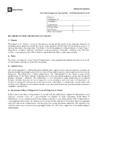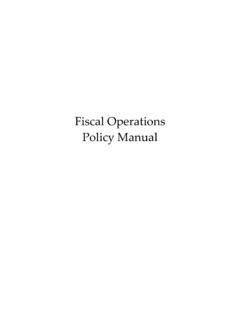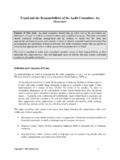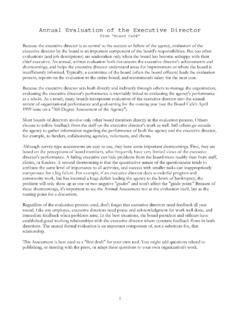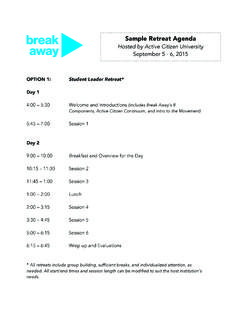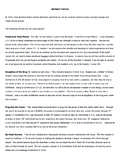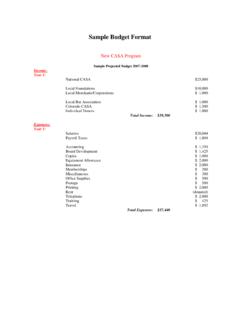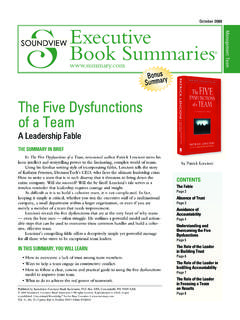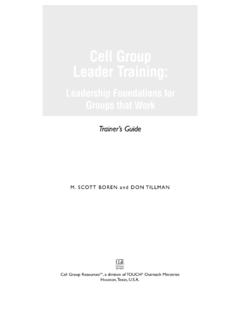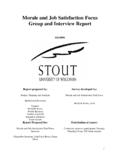Transcription of Nonprofit Risk Management Plan - NIQCA
1 Nonprofit Risk Management plan This SAMPLE Risk Management plan was drafted based on recommendations shared in a board retreat for a real Nonprofit . The plan was drafted with the help of a software tool called: My Risk Management plan that is available from the Nonprofit Risk Management Center. For further information, please visit: Risk Management plan for Nonprofit Risk Management Philosophy Nonprofit aspires to operate in a way that protects the health, safety and security of clients, staff members and volunteers while lifting up the organization's mission and safeguarding assets needed for mission-critical programs and activities. Risk Management Goals The safety of personnel receiving or engaged in delivering services sponsored by Nonprofit shall at all times be regarded as a top priority and this emphasis shall be communicated throughout the organization in order to ensure its understanding. General Safety Principles The safety of personnel receiving or engaged in delivering services sponsored by Nonprofit shall at all times be regarded as a top priority and this emphasis shall be communicated throughout the organization in order to ensure its understanding.
2 Nonprofit seeks to involve appropriate personnel, whether board or staff, at all levels of the organization in the identification of risks and creation of practical strategies in order to make certain that the organization's approach to risk Management considers diverse perspectives and that staff understand their responsibility to protect the confidentiality of our clients, the safety and security of our facilities, the integrity our reputation, the preservation and future growth of assets as well as the fulfillment of our mission. Responsibility for Risk Management Board of Directors Sets risk Management goals, adopts annual operating objectives and budget with risk Management included. Adopts annual capital budget with risk Management in mind. Reviews operational reports to determine compliance and future priorities. Ensures compliance with policies and standards imposed by national organization or accrediting organization.
3 Adopts and establishes policies and standards. Reviews the organization's insurance program periodically. Reviews the organization's risk Management plan annually. 2 Executive Director or CEO Assigns staff to design and carry out safety and risk Management activities. Assigns staff to perform annual review of the safety and risk Management activities. Executes contracts for the organization. Keeps the board apprised of emerging threats and opportunities facing the organization. [Need to identify additional staff positions that will have responsibility and accountability for various risk Management goals.] Risk Management Committee Champions organization-wide effort to protect the vital assets of Nonprofit and engage key stakeholders in risk Management activities. Convenes periodically to review the agency's priority risks and corresponding risk Management strategies. Oversees the development, implementation and monitoring of loss prevention programs.
4 Oversees the purchase of insurance for the organization. Evaluates the insurance program. Governance Structure Articles of Incorporation Nonprofit was incorporated in the State/Commonwealth of [state] on [month, day, year]. The articles of incorporation were last reviewed by legal counsel in [month, year] to ensure compliance with state laws. We have maintained our corporate status by filing with the state as required by law. The date of our last filing was [month, day, year]. Board representatives reviewed the articles for compliance with the current mission and purpose of the organization in [month, year]. The Board and legal counsel will review the articles of incorporation every [number] years to maintain its currency and legality. The original articles of incorporation are stored [storage location name, address] An authenticated copy of the articles are stored [storage location name, address]. Bylaws The bylaws were originally filed and approved by the State of [state] on [month, day, year].
5 Board representatives reviewed the bylaws to determine the need for any revisions and if necessary followed the proper amendment process in [month, year]. All amendments were filed with the state and the last filing was made on [month day, year]. The bylaws were reviewed by legal counsel in [month year] to ensure compliance with federal, state and local laws. The Board will review the bylaws annually and propose amendments as needed. Every member of the board receives a current copy of the bylaws when they join the board and whenever the bylaws are amended. The original bylaws as approved by the state and any amendments are stored [storage location name, address]. An authenticated copy of the bylaws and amendments are stored [storage location name, address]. Indemnification Legal counsel reviewed the indemnification provision for compliance with state law on [month day, year]. The indemnification provision is funded by a Directors' & Officers' liability insurance policy underwritten by [insurance company] under [policy number] with a term of [policy dates].
6 The policy limit of liability is [limit] with a deductible of [amount of deductible or retention]. 3 Conflict of Interest Policy The conflict of interest policy was adopted by the board on [month day, year]. Every year each board member completes and signs a disclosure statement declaring any known conflicts and agreeing to comply with the policy. These annual statements are gathered in [month] of each year. Board Operations [Insert here a description of the current status of a board orientation manual or the aspirational goal that Nonprofit will develop such a manual. Example: " Nonprofit has adopted a Board Manual containing the key policies and expectations of the board. The Manual is reviewed [every two years] by [the Executive Committee of the board] and updates are made on an as-needed basis. Board Orientation To ensure that the members of the Board of Nonprofit are properly trained and prepared for their service, the organization conducts a board orientation training for all board members on an annual basis.]
7 The experienced board members will share their insights and coach the new members in fulfilling their board duties. Board Development The board of Nonprofit is dedicated to improving the skill and knowledge of its members by continually educating the members on the legal, financial, and operational aspects of governing a Nonprofit organization. The board will allocate time during the year to increase its governance knowledge. Board Assessment To become a more effective board, the board members of Nonprofit will conduct a board self-assessment at least once every three years. The board will use the self-assessment as a tool to improve its performance and energize the organization to achieve its mission. Board Recruitment and Nomination Nonprofit strives to have a diverse and qualified board with people who bring the skills, qualities, and expertise needed to lead and govern the organization in accomplishing its mission.
8 Board Minutes Include here a description of how Nonprofit maintains important corporate records of board and committee action. Example: " Nonprofit recognizes the importance of recording accurate and contemporaneous minutes of board meetings and minutes of committees that are authorized to act on the board's behalf, and each board member is aware of his/her responsibility for ensuring the accuracy of the minutes." "The minutes are maintained [in a safe location] in a separate binder to preserve their integrity." or "The minutes are stored with other corporate documents in a safe location to protect them from harm or loss." [Reference to a document retention plan and its mandate to maintain documents such as the articles of incorporation, IRS Determination letter and board meeting minutes into perpetuity would be appropriate here.] Risk Financing Strategy 4 Add appropriate language here that describes the philosophy and accountability for the insurance program at Nonprofit : Example: "To safeguard the assets and resources of Nonprofit , the organization will purchase insurance for those insurable risks of major importance to mission-critical operations and the financial health of the organization.
9 It is the executive director's responsibility to oversee the organization's insurance program and provide an annual insurance report to the board." Human Resources Written Employment Policies Nonprofit believes that written employment policies are an essential risk Management tool. The organization has compiled its key employment policies in a document titled [name of employee handbook or manual]. Communications Regarding Employment Policies Describe the manner in which employees at Nonprofit are informed about personnel policies: Examples: "All new policies are communicated in writing to staff through the use of memos and other appropriate policy documents. In addition, new policies are incorporated in the policy manual when that manual is updated periodically." or "Each time a new employment policy is adopted the employee handbook is re-issued and distributed to staff. Staff members are required to sign an acknowledgement that is maintained in their personnel file, indicating that they received and agree to adhere to the new policy(ies).
10 " or "New policies are communicated verbally and in writing to employees. Staff are also required to confirm their understanding of and willingness to abide by any new policies." Insert here Nonprofit 's policy concerning the review and updating of your key employment policies. For example, " Nonprofit reviews and updates its Employee Handbook every two years in order to ensure that policies remain suitable for the organization and in compliance with state and federal employment laws. The organization obtains assistance from an employment attorney in this effort." Describe the use of job descriptions by Nonprofit : Example: " Nonprofit has developed job descriptions for all paid [and volunteer] positions in the organization. These documents are finalized before the recruitment process begins and used during interviews with prospective candidates to inquire whether the candidate is able to perform all the duties listed.
